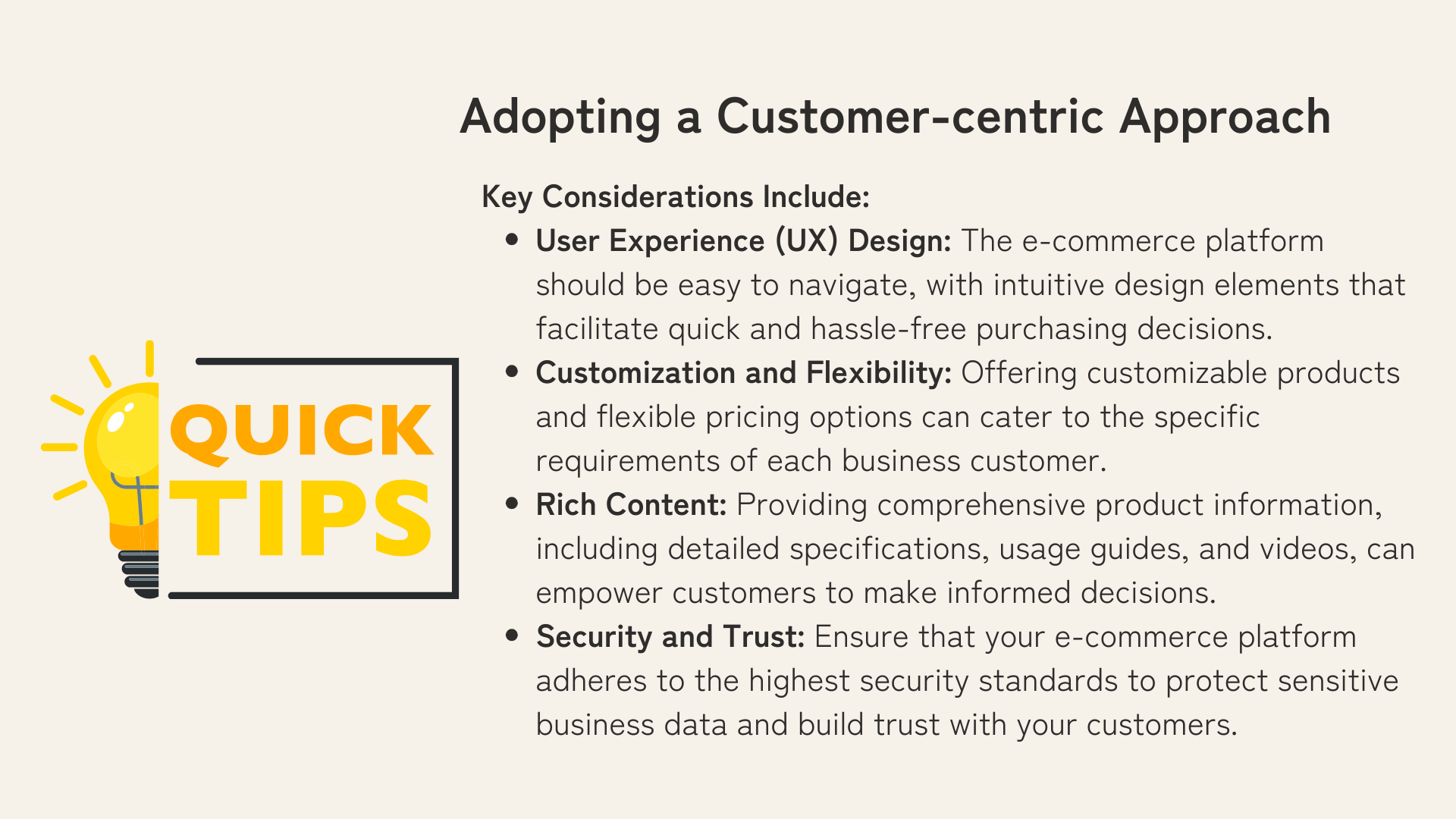Introduction
In today's rapidly evolving digital landscape, the surge in B2B (Business-to-Business) e-commerce has revolutionized how companies interact and transact with each other.
Unlike B2C (Business-to-Consumer) e-commerce, which caters directly to individual consumers, B2B e-commerce focuses on the sale of goods and services between businesses through online platforms.
This blog post delves deep into the world of B2B e-commerce, outlining its fundamentals, the benefits it brings to the table, the challenges it faces, and strategies for success that are easily digestible for beginner business readers.
What is B2B E-commerce
B2B e-commerce, or Business-to-Business electronic commerce, refers to the sale of goods and services between businesses via online platforms.
Unlike B2C (Business-to-Consumer) e-commerce, which focuses on transactions between businesses and individual consumers, B2B e-commerce involves transactions between companies.
This can range from a manufacturer ordering parts from a supplier to a wholesaler selling products to a retailer.
What distinguishes B2B e-commerce is the complexity and scale of transactions, which often involve bulk purchasing, negotiated pricing, and recurring orders.
Key Characteristics of B2B E-commerce:
- Large Transaction Volumes: B2B transactions typically involve larger volumes than B2C transactions.
- Customized Pricing: Prices may vary based on the customer’s buying history, order volume, and negotiations.
- Complex Decision-making: Purchases often require approval from several levels within an organization.
- Longer Sales Cycles: From initial inquiry to final purchase, B2B sales cycles are generally longer and more complex than B2C sales cycles.

Benefits of B2B E-commerce
The shift towards B2B e-commerce is not just a trend but a strategic move embraced by businesses for its manifold advantages.
1. Expanded Market Reach
E-commerce platforms allow businesses to break geographical barriers and reach a global audience, presenting opportunities for unprecedented growth.
Unlike conventional methods restricted by physical boundaries, e-commerce platforms enable businesses to showcase their products and services to a global audience.
A research stated, B2B e-commerce market are expected was valued $7.08 trillion in 2022, and is projected to reach a value of $26.59 trillion by 2030.
This staggering statistic underscores the quintessential role of e-commerce in opening new horizons for businesses seeking expansion beyond local markets.
2. Enhanced Efficiency
Efficiency lies at the core of successful business operations, and B2B e-commerce platforms significantly contribute to this aspect.
Digital platforms streamline the ordering and payment processes, reducing manual errors and saving time for both buyers and sellers.
An insightful report by McKinsey reveals that businesses leveraging digital B2B platforms can increase their sales processing efficiency by up to 10%.
Consequently, both sellers and buyers benefit from a streamlined process that enhances overall operational efficiency.
3. Data-driven Insights
In today's data-centric world, informed decision-making is crucial for business success.
Online transactions generate valuable data that businesses can analyze to gain insights into customer behavior, product performance, and market trends.
Armed with these insights, businesses can make strategic decisions to optimize their offerings and marketing strategies.
4. Personalized Customer Experiences
Leveraging technology, companies can offer personalized shopping experiences through customized product recommendations, pricing, and content.
This level of customization not only fosters customer loyalty but also drives sales.
5. Reduced Costs and Increased Profit Margins
By automating sales processes and reducing the need for physical storefronts, businesses can significantly lower their operating and inventory costs for business.
A survey by Gartner states that by 2023, organizations that have successfully migrated to digital commerce will achieve profitability rates at least a 25% improvement in customer satisfaction, revenue or cost reduction.
6. Enhancing Brand Visibility and Credibility
Online presence is synonymous with brand visibility in the digital age.
By utilizing B2B e-commerce platforms, businesses can enhance their visibility across search engines and social media channels.
Furthermore, an impactful online presence boosts a brand’s credibility, instilling trust among prospective customers.
7. Catalyzing Innovation and Expansion Strategies
E-commerce platforms serve as a breeding ground for innovation, enabling businesses to test new products and market strategies with minimal risk.
The agility and flexibility provided by digital commerce allow companies to adapt swiftly to market changes and customer preferences, facilitating continuous innovation.
8. Promoting Eco-Friendliness and Sustainability
In an era where sustainability is increasingly becoming a business imperative, B2B e-commerce offers an eco-friendly alternative to traditional commerce by reducing the carbon footprint associated with physical stores and logistics.
Challenges in B2B E-commerce
While the benefits are compelling, companies navigating the B2B e-commerce landscape also face several challenges.
1. System Integration
Integrating e-commerce platforms with existing ERP (Enterprise Resource Planning) and CRM (Customer Relationship Management) systems can be complex and costly.
According to a report by Forrester, 52% of businesses cite technology integration as a top challenge in their e-commerce initiatives.
This complexity can lead to increased costs and extended timelines for e-commerce projects, posing a substantial hurdle for businesses.
2. Supply Chain and Logistics Complexity
Managing logistics for large-scale transactions, especially across borders, poses significant challenges in terms of coordination and compliance.
From managing inventory across various locations to ensuring timely delivery without compromising product quality, the logistics challenges are manifold.

3. Complex Customer Expectations
Building a strong online presence and attracting business customers in a highly competitive market requires effective digital marketing strategies.
B2B transactions are inherently complex, involving multiple decision-makers, customized pricing, and bulk orders.
Catering to such nuanced customer expectations online can be daunting as B2B buyers expect companies to understand their unique needs and personalize the online experience accordingly.
Meeting these expectations requires sophisticated e-commerce platforms and strategies, something not all businesses are prepared for immediately.
4. Maintaining Personal Relationships
In a space where personal relationships and negotiations have traditionally played a significant role, replicating these dynamics online is a significant challenge.
Replicating these dynamics in an online environment is challenging. Without the personal touch, businesses must find innovative ways to build and maintain strong relationships with their customers.
Business buyers expect companies to use new technologies to create better experiences.
However, striking the right balance between technology and personalization is a steep hill to climb for many.
5. Cybersecurity Threats
As B2B transactions often involve large sums of money and sensitive corporate information, cybersecurity becomes a paramount concern.
A cybersecurity breach can have devastating consequences, including financial loss and damage to reputation.
Symantec's Internet Security Threat Report indicates that organizations have seen a 67% increase in security breaches over the past five years, underlining the critical need for robust security measures in B2B e-commerce platforms.
6. Scaling for Growth While Maintaining Quality
As businesses grow, scaling their e-commerce operations to accommodate increased demand can be challenging.
It's not just about handling more transactions; it's about ensuring the quality of service, product availability, and customer support scales accordingly.
B2B companies struggle with scaling their operations efficiently, potentially impacting their ability to sustain growth without compromising quality.
The Best Practices for Success in B2B E-commerce
E-commerce in the B2B sector has grown exponentially, necessitating businesses to adopt strategies that ensure success in this competitive marketplace.
While the online space opens up a plethora of opportunities, navigating it successfully requires adherence to certain best practices.
For businesses looking to thrive in the B2B e-commerce arena, the following strategies are key.
1. Invest in Robust Technology
B2B transactions are inherently more complex than B2C; hence, simplifying the buying process can greatly enhance customer satisfaction.
This involves clear product descriptions, easy navigation, and streamlined checkout processes.
Choose an e-commerce platform that is scalable, secure, and capable of integrating with your existing systems.
This foundation is critical for supporting complex transactions and providing a seamless customer experience.
2. Optimize for Mobile
With the increasing use of smartphones in professional settings, having a mobile-responsive design is essential for accommodating customers who prefer to conduct business on-the-go.
This includes responsive design, fast loading speeds, and mobile-friendly navigation features.
3. Personalize the Buying Experience
Use data analytics to understand your customers’ preferences and tailor the shopping experience to their needs, from personalized pricing to customized product recommendations.
Using CRM systems to analyze customer data allows businesses to offer personalized product recommendations, pricing, and special offers.
Utilize customer purchase history to offer tailored product bundles and discounts on frequently ordered items. This approach fostered a 30% uptick in repeat business.
4. Strengthen Your Online Presence
Invest in SEO (Search Engine Optimization) and content marketing to enhance your visibility online and attract potential business customers.
Optimizing your website with relevant keywords, ensuring fast loading speeds, and creating quality content can significantly improve your search engine rankings.
5. Offer Exceptional Customer Support
Excellent customer service is the backbone of successful B2B relationships.
Ensure your customer support team is equipped to handle the intricacies of B2B transactions, including technical queries, bulk orders, and post-purchase support.
Offering multiple channels of support, including live chat, email, and phone, alongside comprehensive FAQs and self-service options can drastically enhance customer satisfaction.
6. Leverage Social Media
Utilize professional networks like LinkedIn, along with other social media platforms, to promote your products, share valuable content, and engage with your target audience.
In addition, optimize user-generated content to your social media platform is a crucial strategy.
Incorporating customer testimonials, case studies, and user reviews on your e-commerce platform can build credibility and trust among potential customers.
Social proof can influence buying decisions and showcase the real-world value of your offerings.
7. Implement Robust Cybersecurity Measures
Given the sensitive nature of B2B transactions, ensuring the security of your e-commerce platform is paramount.
Regular security audits, secure payment gateways, and adherence to data protection regulations are essential practices.
For example, a medical supplies e-commerce platform, introduced end-to-end encryption for all transactions and two-factor authentication for user accounts, enhancing their reputation as a secure platform and increasing customer trust.
8. Use High-Quality Content and Media
High-quality, informative content and clear product images can significantly impact the decision-making process of B2B buyers.
Providing detailed product descriptions, specifications, and use-case scenarios can help in conveying the value proposition effectively.
Adopting a Customer-centric Approach
In the realm of B2B e-commerce, adopting a customer-centric approach is paramount.
This involves understanding and anticipating the unique needs and challenges of business customers, and designing your e-commerce strategy to address these effectively.

Conclusion
B2B e-commerce represents a significant shift in how businesses transact with one another, offering efficiency, scalability, and opportunities for global expansion.
While challenges exist, the companies that harness the power of digital technology, prioritize customer experience, and stay ahead of emerging trends will be best positioned for success in this dynamic landscape.
Whether you are a manufacturer, wholesaler, distributor, or any other type of B2B company, embracing e-commerce is no longer optional but a necessity in the digital age.
By understanding the basics and implementing strategic approaches outlined in this guide, you can unlock the full potential of B2B e-commerce for your business.








